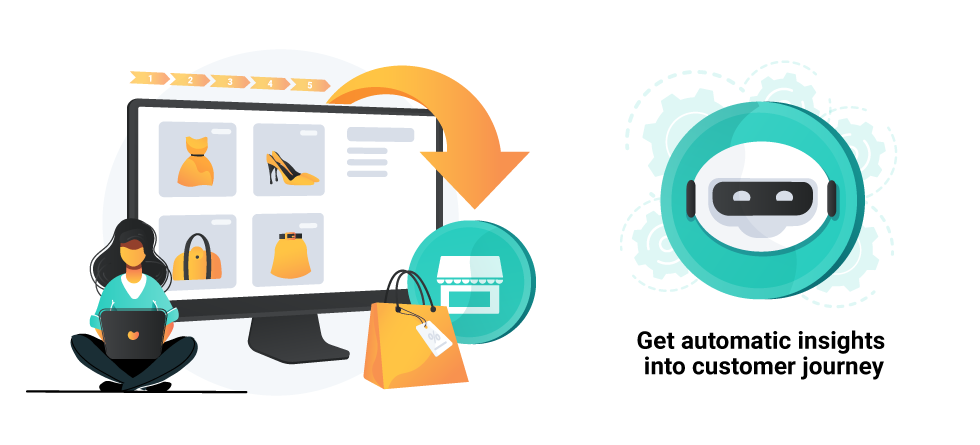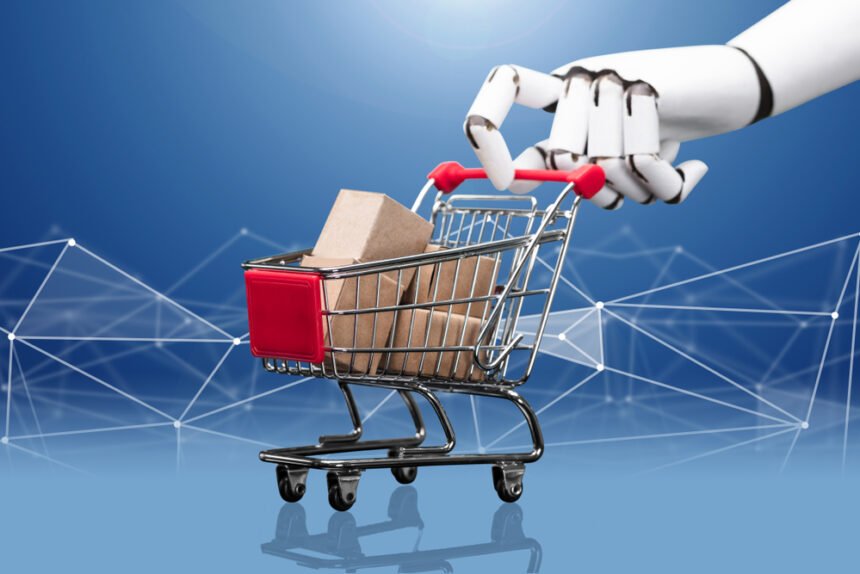The term “artificial intelligence” has certainly become a buzzword that’s thrown around a lot. But behind all of the hype and pop culture references is a technological marvel with some extremely powerful capabilities, especially for B2C businesses. In essence, artificial intelligence is a field of computer science that teaches computers how to interpret data and derive answers from it. This is, of course, an oversimplification of what artificial intelligence is but modern implementations of AI are far more complicated, albeit based on the same fundamental principle.
- Top 10 Ways eCommerce Businesses Use AI
- 1. Smart Contextual Search
- 2. Get automatic insights into customer journey
- 3. Flag spam and fake reviews
- 4. Give customers better recommendations
- 5. Retargeting
- 6. Conversational AI
- 7. More effective upselling and cross-selling
- 8. Messaging Apps and Google RCS
- 9. Enhance customer experience with personalization
- 10. Autonomous shopping assistants
A growing number of companies have become dependent on AI technology. Gartner reports that 37% of companies used AI in the workplace in 2019. That figure will likely rise in the near future.
One of the fastest-growing (primarily B2C) industries is eCommerce and it’s also one of the biggest testing grounds for AI implementations. eCommerce businesses are embracing AI for a number of use cases as they need a more efficient way to process the terabytes of data they collect regularly and drive better results.
There are countless reasons that startups are benefiting from AI. In this article, we’ll take a look at 10 of the most powerful uses of artificial intelligence in the eCommerce industry.
Top 10 Ways eCommerce Businesses Use AI
The benefits of using artificial intelligence are well established and so the question isn’t what benefits do eCommerce businesses get but rather how can eCommerce businesses get those benefits. And the good news is that there is no shortage of ways in which eCommerce businesses can implement AI but the following are ten of the most popular AI chatbot use cases:
1. Smart Contextual Search
As we said, the fundamental use of artificial intelligence is to efficiently process large data sets to find meaningful data autonomously. Thus, eCommerce businesses also use AI for big data analytics related to consumer preferences, trending products, customer journey, etc. Smart search is based on a similar premise and uses AI to give users search predictions that are more likely to result in a purchase. Google has been using contextual search for years, but has recently focused more on it.
An example of a contextual search is, when a potential customer enters “bags”, the AI search engine might suggest changing their search query to “school bags” if it’s back to school season. Similarly, AI can also make use of browser cookies by suggesting search phrases depending on what the customer was previously looking for. Certain stores deploy cookies that keep track of the user’s Google searches to keep in-store results as relevant as possible.
2. Get automatic insights into customer journey
Customer journey includes all of the user’s actions starting from opening the website or mobile application to leaving it. Customer journey information is collected in different types of metrics including the series of pages a customer opens and for how long.
More often than not, there is a trend in different types of customers and eCommerce businesses use AI to analyze millions of customer journeys and get critical insights such as pages that are responsible for the majority of the bounce rates.

3. Flag spam and fake reviews
Artificial intelligence is extremely effective at telling natural speech from that of a computer/bot and thus can be used to flag spam comments or reviews. Many eCommerce businesses also use AI to identify fake reviews based on factors such as length, sentence formation, IP addresses (multiple reviews from the same computer), etc.
4. Give customers better recommendations
Product recommendations have a big impact on almost every aspect of online shopping – from how long a potential customer spends on your website and whether or not they even find what they’re looking for to how much they spend. And artificial intelligence can make a big difference in the effectiveness of product recommendations. For instance, big eCommerce platforms like Amazon rely on AI to not only come up with better recommendations live, but also send product recommendations later on through email.
5. Retargeting
Retargeting is a form of marketing that focuses on customers who are already aware of your business (also known as warm leads). However, artificial intelligence is different from other methods of approaching warm leads because AI can utilize significantly more data about the customer and retarget the customer while calculating why the customer left the website/app and offer the best possible solution.

6. Conversational AI
Conversational AI is a form of artificial intelligence that focuses on the natural speech capabilities of computers. Conversational AI is most commonly implemented in the form of chatbots. Chatbots themselves vary in capabilities depending on the area of business operation they are designed for. That said, the most powerful way to implement conversational AI is customer service chatbots.
Chatbots can be used to answer common queries, take feedback, and even make purchases directly from the chatbot. You can learn more about Conversational AI by clicking here.
7. More effective upselling and cross-selling
Upselling and cross-selling are two of the most effective ways of increasing average cart value but both of these methods are difficult to implement. One of the reasons behind this is that different customers react differently to upselling and cross-selling at various stages of their customer journey.
Most eCommerce companies attempt to do this at the checkout page because spamming product recommendations can make the shopping experience less pleasing. This is where artificial intelligence improves things by using a combination of historical customer data, category-specific preferences, and a powerful product recommendations engine to make upselling and cross-selling a more fluent part of the customer journey.
8. Messaging Apps and Google RCS
Consumers are spending more and more time on messaging apps and it’s highly likely this growth will continue. At the same time, business messaging through email is becoming less effective with newer generations checking email less frequently and aggressive email filters. In response, eCommerce businesses are establishing a bigger presence on social media and using AI bots on messaging platforms like Facebook Messenger and WhatsApp to not only maintain 2-way communication but also to make purchases even easier. Google RCS is doing a similar job, replacing traditional SMS and email communication with far more effective, rich-media messages on the default SMS app on Android devices.

9. Enhance customer experience with personalization
Personalization will be the most important deciding factor in managing customer relations (which in turn, will be one of the main product differentiators this decade). Therefore, it’s going to be imperative for eCommerce businesses to improve customer loyalty. And the most efficient method of doing that is by using artificial intelligence.
Every modern business collects useful data about customers but most of it isn’t used due to the cost of processing large data sets. However, AI automation makes data processing a lot more economical and viable for things such as personalized business messaging.
10. Autonomous shopping assistants
An autonomous shopping assistant can be thought of as an extension of conversational AI but instead of being a feature built into the website or mobile application and with limited functionality, shopping assistants are fully-fledged, usually standalone applications (mobile or browser web apps) that bring a lot more functionality to users. They use conversational AI to understand customer queries and responses and can-do common things like finding the nearest stores, making reservations, ordering groceries, finding recipes, and setting price alerts as well as complex tasks such as adding virtual makeup or clothes, allowing you to design and buy your own products, and use AI to find products using just pictures.
Artificial intelligence is one of the fastest-growing industries today and with any new technology, the early-mover advantage is crucial. It’s even more critical in an industry as competitive as eCommerce. That said, these top 10 most powerful ways to leverage artificial intelligence should give you a better understanding of the practical use and value of AI for eCommerce businesses.










